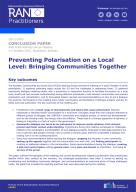Details
- Publication date
- 12 December 2022
- Author
- Directorate-General for Migration and Home Affairs
- Country
- Sweden
- RAN Publications Topic
- Community engagement/civil society
- Social cohesion and polarisation
Description
The Families, Communities and Social Care (FC&S) Working Group convened a meeting on 4 and 5 October in which participants: 1) explored polarising topics across the EU and the challenges in addressing them; 2) gathered community dialogue initiatives either with a preventive or restorative function to facilitate encounters on a local level, build trust and increase understanding among different individuals in and between communities and prevent polarisation and radicalisation; and 3) formulated lessons learned and recommendations on how to put a dialogue into practice. Participants at this meeting were mainly coordinators and facilitators of dialogue projects working for NGOs and local authorities.
The key outcomes of this meeting are:
- Practitioners see a broad range of developments and topics that cause polarisation between individuals or between/within communities on a local level. Examples range from the unequal treatment of different groups of refugees, the LGBTQIA+ community and religious groups, to recent key developments such as the housing crisis, the energy crisis and inflation. These lead to a sharper opposition of opinions, a feeling of inequality or a lack of trust in the government.
- Community dialogue can serve as an instrument to improve social cohesion, find common ground and foster mutual understanding. Practitioners during this meeting exchanged on challenges related to the coordination and facilitation of such dialogue projects. Examples of discussed questions are how to get the right people involved, how to create a common goal, and how to facilitate a dialogue and making sure it is not counterproductive.
- Some key recommendations before starting the dialogue: mapping the situation in your community, setting up the agenda together with the communities you work with, and finding participants by creating an elaborate network in the communities. Some recommendations during the dialogue: creating a safe and neutral space, setting ground rules, being open and honest as a facilitator, and being in service of the group.
This paper outlines the highlights of this meeting, the current developments related to polarisation that practitioners identify within their context at the moment, the challenges practitioners face when it comes to setting up, coordinating and facilitating community dialogue, and recommendations to overcome some of these challenges. Lastly, the paper has included the inspiring practices that were discussed during the meeting.

